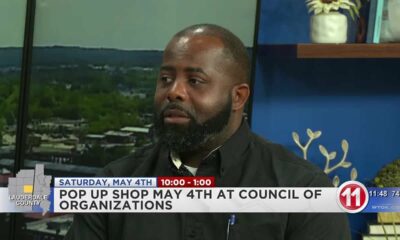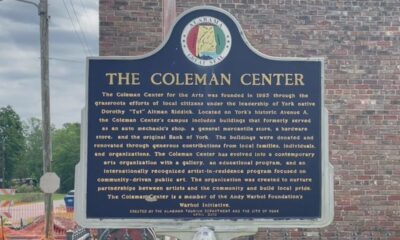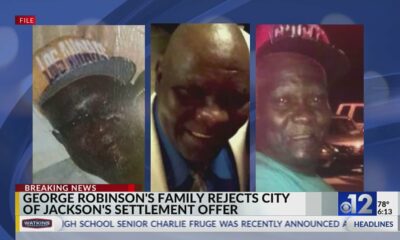Mississippi Today
SuperTalk radio was a powerful mouthpiece for welfare fraudsters — while raking in welfare funds itself
SuperTalk radio was a powerful mouthpiece for welfare fraudsters — while raking in welfare funds itself
The state of Mississippi was entering a new day in the fight against poverty.
At least that's what conservative talk radio station SuperTalk would have you believe.
It was the summer of 2018, and radio host Paul Gallo was visiting with John Davis, then-director of the Mississippi Department of Human Services, and nonprofit founder Nancy New on site during a government summit at the Westin luxury hotel in downtown Jackson.
New and Davis were hyping their ill-conceived welfare delivery model, Families First for Mississippi, which resulted in the theft or misspending of nearly $100 million. The pair would later plead guilty to several felonies after perpetuating what officials have called the largest public fraud scheme in state history.
“Sometimes it just takes people like Nancy New and John Davis … to say, … ‘We're going to take the lead on this,'” Gallo boasted.
“Please pay attention,” Gallo said at the same event, “because number one, this will change lives.”
SuperTalk consistently boosted the work of Families First to its statewide audience, broadcasting the organization's original ribbon cutting, the opening of its generously renovated new center, events featuring free homemade ice cream, massive high school rallies, “exclusive” behind-the-scenes reports on its services, and the infamous Brett Favre radio ad that caused the athlete to be sued.
And for all its promotion over the years, SuperTalk received more than $630,000 in welfare funds.
The money came from MDHS, the welfare agency, which previously employed SuperTalk's own CEO Kim Dillon and, at the time of the welfare scandal, her son.
With 26 radio stations in its operation, and 45 more to which it distributes the news, Supertalk's traditionally conservative, older white audience is far from the population needing welfare services. But the media company, officially called TeleSouth Communications, founded and owned by Steve Davenport, had access to the innards of Mississippi's political machine – and therefore taxpayer funds – because of the platform it gives GOP leaders to promote their agenda.
Now SuperTalk is at the center of two subpoenas and allegations of contract steering as lawyers in the state's ongoing civil suit attempt to unravel the radio network's larger role in Mississippi's good ole boy club.
“Steve (Davenport) and I had drinks with the Gov (Phil Bryant) on Wed night,” Kim Dillon texted Davis in May of 2019, just one month before Davis was kicked out of office for suspected fraud. “He was very complimentary of you. We had the best time!”
At the Westin that day, leaders including then-Gov. Bryant declared that the state did not have to separate families in order to prevent neglect; that neglect was a product of poverty, and it could be eliminated by placing resources directly into the homes of needy families.
Gallo put it best: “Every single day across the state we have the justice court system tearing these kids away from the family, and if they just had one hand to reach out. And if that's a possibility, why hasn't somebody done this before? Because, I mean, it's one of those things that could have saved a lot of families,” he said.
With a faraway stare and her mouth slightly open, Nancy New looked over to the camera, then down at her fidgeting hands.
“Instead of taking the kids out of the house, put them in the court system, and you have to deal with them,” Gallo continued, “and ultimately, if there's a possibility of a foster family getting some financial help, what if that financial help went to the mom?”
Gallo was describing welfare.
Behind the scenes, though, Davis, New and others were diverting tens of millions of these dollars away from the needy – including, notoriously, $8 million to the pet projects of former NFL legend Brett Favre.
Favre himself received $1.1 million in welfare funds from Nancy New's nonprofit to cut a radio ad at SuperTalk promoting Families First. The ad ran several times in the fall of 2018, according to an invoice obtained by Mississippi Today, nearly a year after he received his first payment. Favre has since returned the funds.SuperTalk itself was one of those welfare recipients cited in State Auditor Shad White's explosive 2020 audit report. “Due to the unreasonable cost of the advertising,” the audit found, “… and the lack of any correlation to how the advertising benefited the programmatic nature of the TANF program, these costs are questioned.”
Kim Dillon, Gallo and Davenport declined or did not respond to interview requests from Mississippi Today. Davenport, a major Gov. Tate Reeves donor, did provide a canned written statement saying his company “fulfilled its contractual obligations.”
He did not address the characterization of SuperTalk as a campaign tool.
Of the $632,388 cited in the audit, most ($435,000) was paid during fiscal year 2019, the year Gov. Reeves ran for governor.
“It looks like they kicked their spending with TeleSouth into overdrive in FY 2019,” said Logan Reeves, a spokesperson for the auditor's office. “… They (Families First) were advertising left and right, doing all kinds of stuff, as I think the audit makes clear.”
About half of the funds came from New's nonprofit Mississippi Community Education Center and the other half came from Family Resource Center of North Mississippi, the other nonprofit helping to run Families First.
The two nonprofits paid significantly more than any state agency paid SuperTalk in those years.
While the auditor questioned the payments, these expenditures were not listed as a fraudulent or unallowable expense in a separate forensic audit MDHS commissioned and released in 2021. Because TeleSouth conducted the work it was hired to do, Logan Reeves said, the auditor's office did not issue a demand for repayment to the network.
TeleSouth is not one of the vendors MDHS is targeting in its ongoing civil lawsuit to recoup the misspent money. MDHS initially filed its complaint in May, mostly targeting individuals and companies that were cited in the forensic audit, but it amended its complaint in early December to include several additional vendors.
The welfare department, an agency under the governor's office, has not provided the public a full explanation for the standards they used to determine which of the dozens of vendors listed in the audits to target for repayment.
Some of the entities newly added as defendants to the lawsuit, such as Lobaki Inc., a Jackson-based virtual reality company, were added to the suit even though they completed the work for which they were hired. In Lobaki's case, the attorneys argue that the company's agreement with the nonprofits required them to follow MDHS grant policies and applicable state and federal law – which is why they're allegedly on the hook for those misspent funds.
The contracts between the nonprofits and TeleSouth – which were not originally public records since they did not include a state agency – have still not been made public, nor has a breakdown of the purchases under the contract.
“SuperTalk entered into contracts with the Mississippi Community Education Center and the Family Resource Center of North Mississippi to provide advertising services,” SuperTalk general counsel Ashley Tullos Fortenberry said in a short statement to Mississippi Today for this story. “The services outlined in those contracts were performed and SuperTalk was qualified to provide the services—which were intended for a state-wide reach—as it operates 26 radio stations (consisting of both talk and music formats) that cover the state and a news network that distributes news and advertising to over 45 radio stations throughout the state.”
TeleSouth isn't the only statewide radio network; both Mississippi Public Broadcasting and Mississippi Owned Radio (MOR) Network provide statewide radio coverage. MPB, a publicly funded agency, could even provide services to the state for free.
Within the larger political landscape of Mississippi, though, taking public funds and providing favorable coverage to political leaders and their ideas isn't an unusual arrangement for SuperTalk.
SuperTalk's parent company TeleSouth Communications has received at least $6.2 million in public funds from the state since 2009, according to Mississippi Today's review of public expenditures, while giving politicians and agency heads ample airtime for braggadocious dialogues without the risk of facing pointed questions about the consequences of their policy decisions.
“Where they have built their little empire is access. If that's who's in charge, then that's who they want to be next to,” said longtime politico and professor Marty Wiseman.“… I guess you would describe it as a transactional thing, you know, ‘You scratch our back, we'll scratch yours.'”
SuperTalk bills itself as a news program, but “I don't think the average person who listens every now and then realizes the pipeline that SuperTalk has into government,” Wiseman continued. “They just take it at face value that who they're having on there is probably telling the truth.”
SuperTalk's tie into government is possibly best illustrated through the Families First debacle.
SuperTalk CEO Kim Dillon's son Logan Dillon, for example, worked as a lobbyist for MDHS during the scandal while his then-wife Alyssa Dillon worked for Families First.
A former Bryant staffer and accountant executive at SuperTalk, Lynne Myers, left the radio network to become MDHS's communication director in 2018. Right before Davis left office, she sought his permission to extend the agency's contract with SuperTalk. Her husband, Kevin Myers, and their daughter also worked for Families First.
SuperTalk's former digital marketing director Dawn Dugle is the one who introduced Davis to fitness instructor Paul Lacoste, who then secured a $1.3 million contract with Families First – one of the first red flags during the start of the auditor's investigation.
But SuperTalk's connections went much higher than the welfare office.
In 2020, members of Bryant's inner circle allegedly directed Austin Smith, Davis' nephew who was overseeing a federal preschool grant for the state, to enter an expensive advertising contract with SuperTalk, Mississippi Today first reported.
Smith, who is facing civil charges over the $430,000 in welfare contracts he received, said he refused to contract with SuperTalk because the grant period for expending the funds had expired, he explained in a civil court filing. Expenditure records obtained by Mississippi Today do not reflect payments to SuperTalk under this grant, but Smith did appear on the radio program to promote the grant.
While Smith was employed by the Mississippi Community College Board, the state agency that administered the preschool grant, he was also working on a contract for Families First. Smith has not been charged criminally.
Bryant frequently gloated about Mississippi's success in securing the $10 million grant.
“Just think, if you're a single mom in the Delta trying to pay for child care and go to school, it's nearly impossible,” SuperTalk quoted Gov. Bryant as saying. “This grant will help bridge that, and we will be able to find more young ladies that will be able to go to work, find a job, have a career and live the American dream right here in Mississippi.”
But Bryant was unaware, when asked during an interview with Mississippi Today in April, that the state only ended up spending 60% of the funds, mostly on equipment and materials for the centers, not on more vouchers for kids. About $190,000 of those funds went to New's nonprofit. The state had to give $4 million back to the federal government. The grant didn't result in any more kids in child care. The program was a flop.
“I could sit here and talk to you for a very long time about that grant in childhood and things that should have been done differently,” Smith told Mississippi Today in an exclusive interview in November. “... It did not accomplish what it needed to accomplish because before we ever got the grant, it was already spent. It was already decided where it was gonna go, who it was gonna go to, and what it was gonna go for.”
Smith alleges that after the grant ended, he was the only employee working on the grant to be fired.
“Among the PDGB5 Grant employees retained were Austin Smith's secretary, the niece of SuperTalk's prominent host, Paul Gallo,” reads Smith's civil court filing.
Generally, Smith feels that in the course of the welfare case, “there's only a certain number of people that's been handpicked and targeted.”
“There's so many more people involved in this,” he added.
Smith's attorney Jim Waide has subpoenaed TeleSouth for several items, including any communication regarding receiving payment for providing interviews to Smith, New, Davis, Favre, Bryant, White and others.
The attorney MDHS originally hired to craft the civil suit, former U.S. Attorney Brad Pigott, also subpoenaed TeleSouth back in July, but within days of that filing, Gov. Reeves' office chose to fire Pigott. The legal team that took over the case, from the firm Jones Walker, appears to have abandoned that subpoena.
Waide similarly subpoenaed Gov. Bryant for any of his communications related to paying TeleSouth for advertising while he was governor, as well as communication with Davenport specifically. Bryant confirmed in a following motion that he possesses communication about paying TeleSouth, but he objected to turning it over, citing executive privilege. Hinds County Circuit Court Judge Faye Peterson isn't expected to rule on whether Bryant must comply with the subpoena for several weeks.
While Gallo used his show to elevate the anti-poverty programs he said would “change lives,” Mississippi was actually turning away most poor applicants for the cash assistance, formally called Temporary Assistance for Needy Families, or TANF.
Only about 4,000 families were receiving the benefit, a monthly check of, at the time, no more than $170 for a family of three.
When pressed in April about the lack of resources reaching families during his administration, Bryant told Mississippi Today, “I did not know that was not happening. John reported to me one time that a number of people had dropped off, and I said, ‘Tell me why.' And he told me that they had not reapplied.”
The low approval rate was publicly known and reported on by news outlets as early as 2017 – but not on SuperTalk's website.
“... (W)hat if that financial help went to the mom?” Gallo asked the welfare officials.
Ignoring the progressive logic in the host's rhetorical question, Davis responded with a winding answer about his boss Gov. Bryant's desire to create a “holistic collaborative approach” to delivering social services in the challenging environment of “siloed” government bureaucracies.
Few impoverished families were actually helped by the services Families First advertised, sometimes at lavish events with sophisticated commercials and an abundance of branded swag.
But Supertalk helped prop up the facade.
“I'll tell you, the governor never stops. I think he's up from daylight ‘til way after dark making things happen for Mississippi,” radio host JT Williamson said during a 2018 interview with New and then-first lady Deborah Bryant at the Mississippi Coast Coliseum, where a Families First “Healthy Teens Rally” was taking place.
The rallies, which happened a few times a year in different areas across the state, were a cornerstone of the Families First for Mississippi initiative and reportedly spearheaded by Gov. Bryant.
“We're trying to encourage them to make healthy choices – mentally, physically and every other way,” Deborah Bryant told SuperTalk, “so that they can handle the hard knocks when they come that they don't have any choice over, to stay away from drugs, to have children in a timely manner and not when, you know, just have them, just because it just, ‘oops by the way,' you know? These children deserve better lives than that.”
The conference brought thousands of high school students together to hear lectures that bordered on self-promotion from sports celebrities like retired WWE wrestler Ted DiBiase Jr. – who received $3 million in welfare funds – and former running back Marcus Dupree. Both athletes appeared on SuperTalk during this time to promote the welfare programs. DiBiase and Dupree are targets in the welfare agency's ongoing lawsuit that attempts to claw back the funds.
“In talking about the governor … like this thing right here, to put back into these kids,” Williamson said as the crowd of teens roared in the background. “And we all know that this is the future of Mississippi, and when you see the future is here, and we see these young people that are here today that are listening right now to Ted DiBiase Jr., who are taking all this in, and soaking in all this information, and to understand this is where it starts. And this is where we have to go back and fix things, with education and employment opportunities and different things to keep people from going down the wrong path.”
Mississippi lawmakers, including under Bryant's leadership as lieutenant governor from 2008-2012, have underfunded public schools almost every year since they created the funding formula in 1997 to determine how much money schools need to provide adequate education to Mississippi children. Mississippi also typically maintains the lowest workforce participation rate in the nation and the lowest median earnings.
Emma Briant, an author and British researcher at the George Washington University School of Media and Public Affairs specializing in propaganda and political communication, likened Mississippi's relationship with SuperTalk to the tactics of Cambridge Analytica, a British data-mining firm accused of manipulating multiple elections across the globe. Briant was the expert called to testify in Fair Vote Project's lawsuit in Hinds County against architects of the Brexit movement, who attempted to launch a data firm in Mississippi.
“Using state resources or government resources to essentially, by proxy, finance your own political advertisement and reputational enhancement is something you see in a weak democracy,” said Emma Briant, “It's the sort of thing that we saw in some of Cambridge Analytica's campaigns in Africa, and it's not the sort of thing you would wish to be happening in the U.S. in 2022.”
Davenport, who introduced Bryant at his election night party in 2007, donated a total of $10,800 to Bryant from 2007-2015, according to FollowTheMoney.org. He donated a couple grand to current Gov. Tate Reeves in his previous campaigns, but a few months before the 2019 gubernatorial election, Davenport and his wife each gave Tate Reeves $15,000.
“I told him (Bryant) he needed to help Tate with his commercials,” Dillon texted Davis in May of 2019.
TeleSouth has contributed at least $3,000 to Bryant from 2011-2015, according to FollowTheMoney.org, and $6,000 to Tate Reeves from 2004-2011.
TeleSouth has received advertising work from Mississippi Department of Human Services for many years, and even caught heat from PEER, the legislative watchdog committee, during the 2000s for raking in hundreds of thousands under sole-source, no-bid contracts.
Criticisms about using public funds to prop up a political apparatus are nothing new.
The relationship continued into Gov. Bryant's administration.
The welfare agency continued to contract with the radio network, such as in 2016 to advertise things like iPay, the program that allows fathers to pay child support online, or in 2018 to tell people how to apply for the federal Low Income Home Energy Assistance Program. The contracts at this time went through a Request for Proposal, or RFP process, according to records obtained by Mississippi Today.
MDHS directly paid TeleSouth almost $780,000 from 2009 to 2019, with amounts varying greatly from year to year, according to Mississippi Today's review of public expenditures on the state's Transparency website. While the spending mostly declined over the decade, it did spike to $141,290 in 2016, John Davis' first year as director.
A Mississippi Today review of MDHS expenditures labeled under the TANF Work Program shows the department did not use welfare money to pay for its TeleSouth contracts, except for $15,262 in 2018. This payment has not been analyzed in any audit.
The Division of Medicaid – the agency that provides health insurance to very poor Mississippians, including many pregnant people, and often fails to get the word out about their services – has also spent at least $380,000 over the years advertising with SuperTalk.
"I would assume that if you're out here advertising for Medicaid benefits or for mothers of dependent children, the audience of SuperTalk — which usually advocates for cutting Medicaid — is probably not the place you should be advertising," Franks told the JFP.
It seems to have taken a scandal for this long-running trend to end. The Mississippi Department of Human Services, which experienced a vast leadership turnover after the arrests in 2020, has not paid the radio network since the arrests. Medicaid's last payments to SuperTalk were in 2018.
When asked why MDHS ended its advertising with SuperTalk, the agency plainly said in a statement that “MDHS is committed to utilizing taxpayer funds in matters guided by and in compliance with all federal and state policies … MDHS takes seriously the stewardship of the message and resources entrusted to the agency by the taxpayer.”
The agency also said its current strategy is to focus on “earned media,” a term that refers to promotion it can acquire for free, such as traditional news articles or social media mentions.
The Mississippi Department of Rehabilitation Services recently contracted with SuperTalk to run ads about prom safety. Though, Gallo once admitted on his show, “I do understand that we don't have a large audience of 13- to 18-year-olds in talk radio and that's a shame and that's their loss.”
The state agencies that have paid SuperTalk the most since 2009 are Mississippi Department of Transportation ($2.3 million), Mississippi Department of Public Safety ($1 million) and Mississippi Department of Human Services ($780,000).
Public service announcements are one thing, but in some cases, public agencies are actually paying for the talk radio interviews themselves. That was true in the case of a package SuperTalk put together in 2020 with the Mississippi Community College Board, which included three interviews with Gallo as part of the contract. In broadcasting, these promotional deals are called “remotes” because the radio hosts visit the paying client on site, but in the case of SuperTalk, it's not always clear the station is getting paid for the coverage.
Ironically, the community college board is located inside the same complex as Mississippi Public Broadcasting.
Bob Sawyer, a financial advisor in Gulfport and former chairman of Mississippi Public Broadcasting's board, has long lamented that the advertising TeleSouth has provided could be done for free at the publicly funded station.
Sawyer said state leadership only had one issue. “The only thing they had issues with is they felt like it (MPB) was a little too liberal,” he said.
State agency payments to Supertalk have steadily declined since the 2000's, from $831,637 in 2009 to $609,473 in 2016 to $228,722 in 2022. This does not account for money SuperTalk receives through state contracts with other ad agencies that buy placements at the network.
These figures also do not include the public funds SuperTalk may receive through other passthroughs, such as it did through Families First.
The private nonprofit structure of Families First, plus a breakdown of internal controls at the welfare agency, meant that much of the public TANF money they spent, including at SuperTalk, was not public record until the auditor included it in his audit report.
“The funneling of this kind of money that was taxpayer funded for welfare, for helping the most marginalized and vulnerable people,” Briant said, “the fact that that was being funneled into a political campaign that was all about image management and branding and trying to sell these elected officials to their own audience, not to the people who most need this welfare is just very blatantly a disgusting misuse of resources to fuel political propaganda.”
But the $2.2 million TeleSouth received in that same time period dwarfed what the state paid other radio broadcasters, some of which have broader audiences, such as iHeart Media ($110,000), New South Radio or MIX 98.7 ($111,000), The Radio People or Y101 ($3,000), or even American Family Association ($31,000).
The state also paid nearly $700,000 to Snapshot Publishing, the ad firm owned by Gov. Reeves' sister-in-law Leigh Reeves.
!function(){"use strict";window.addEventListener("message",(function(e){if(void 0!==e.data["datawrapper-height"]){var t=document.querySelectorAll("iframe");for(var a in e.data["datawrapper-height"])for(var r=0;r SuperTalk is not a cheerleader for every state agency, though. In mid-2019, the network interviewed State Superintendent of Education Carey Wright, blasting the Mississippi Department of Education for not being able to calculate how many teachers would receive a proposed pay raise. “Her interview on Gallo was a train wreck. She blamed it on their computer system,” Dillon remarked to Davis, referring to Wright. “... Gallo compared her to Hillary.”
Wright, who was appointed by the department's board, not the governor, often found herself in the crosshairs of Republican politicians.
And the Mississippi Department of Education hadn't paid SuperTalk since 2009.
Texts gathered so far in the welfare case make SuperTalk seem like the water cooler for Mississippi's most powerful. And like many government programs, Families First was infected by gossip, backstabbing and politics.
In the last months leading up to Davis' ousting, the welfare program was consumed by infighting between the two nonprofits selected to run the program.
Bryant allegedly directed Davis to cut funding to the nonprofit in the northern part of the state, Family Resource Center of North Mississippi, Mississippi Today first reported, because its director Christi Webb supported Democratic candidate Jim Hood for governor.
“Kim just called and said to hold firm,” Davis texted a colleague in March of 2019. “Also had a lot to say about Christi and what the Gov said when he was in to talk to Gallo. CRAZY WORLD.” This article first appeared on Mississippi Today and is republished here under a Creative Commons license.
Mississippi Today
Senate confirms Gov. Tate Reeves’ economic development chief despite report of toxic workplace, claims of harassment
The Mississippi Senate on Wednesday unanimously confirmed Bill Cork as Gov. Tate Reeves' pick for a permanent chief economic development officer, despite a background report provided to senators that he “created a toxic workplace” and had faced complaints including sexual harassment and creating a hostile work environment.
In a hearing before his Senate confirmation, Cork said he did nothing wrong, has a winning economic development record, has overhauled MDA.
“… If that takes a little hostility to get that done, that's what's going to happen,” Cork said in the hearing on Tuesday.
Cork is now the first permanent director of the state's economic development agency since 2021, when former agency director John Rounsaville resigned after sexual misconduct allegations.
Cork is credited with recently helping the state land record-setting large economic developments, including Amazon Web Services' commitment to spend $10 billion to construct two “hyperscale data centers” in Madison County.
A background report provided to the Senate Finance Committee before members voted to confirm him said that Cork, who has worked at MDA since September of 2020, was investigated by the Mississippi Personnel Board in 2021. The investigation followed a claim against Cork of sexual harassment, age discrimination and creating a hostile work environment while he was serving as chief economic development officer at MDA.
The personnel board said it conducted the investigation at Gov. Reeves' request. It submitted a report to Reeves after the investigation that said Cork had been uncooperative with the investigation, and that while no legal violations were found, “Cork's management style has created a toxic workplace.” Personnel recommended Cork receive a written reprimand and that he complete at least 12 hours of training on workforce harassment, which he completed.
Cork was traveling Thursday, his office said, and could not be reached for comment. In a Senate Finance confirmation hearing on Wednesday, Cork addressed the report after Sen. Bradford Blackmon asked about it.
Cork said he helped lead “reorganizing and reforming” MDA, resulting in two-thirds of the project management and international teams leaving the agency, and “we had a small cadre of employees that didn't like what was happening.”
“At the end of the day, the state Personnel Board found I hadn't done anything illegal, but that I was a tough boss,” Cork said. “Some people find that level of tough and directedness to be a little hostile. None of it was directed at anyone, but when you're trying to put together a winning team, you just don't settle for second-place.
“… I don't apologize for anything I've done because I didn't do anything wrong,” Cork said. “I didn't cooperate with the investigation because I didn't do anything wrong, and that's exactly what that investigation found.”
State Personnel Director Kelly Hardwick said: “Regretfully, (Cork) didn't cooperate with the investigation, which might have changed our determination. Because he didn't, we were left with only the testimony of the accusations.”
Hardwick declined to provide details of the allegations against Cork, and his office would not release its report to Mississippi Today, citing public records exemptions for personnel records.
Hardwick said Cork did successfully complete the state workplace harassment training and implemented some of the practices recommended in the training.
“He's been shown to be successful and there have been no other complaints on him since,” Hardwick said. “From our standpoint he successfully did what we recommended to the governor.”
Both the Senate Finance Committee and full Senate voted unanimously for Cork's confirmation.
Senate Finance Chairman Josh Harkins noted the report said personnel board found no legal violations, and that Cork openly addressed the allegations in committee. He said he received recommendation letters for Cork from across the state and country and, “It's hard to argue with the product MDA has put out in the last few months.”
A spokesman for Reeves praised Cork, said the “old” personnel complaint is not credible and criticized Mississippi Today.
“Bill Cork has gotten better results for the people of Mississippi than almost any other employee of state government in decades,” Reeves Deputy Chief of Staff Cory Custer said in a statement. “… (Cork) opted to make the results of the investigation known, addressed it in detail in his confirmation hearing yesterday, and was then unanimously confirmed. It would not be a surprise to see a biased article that hypes up discredited nonsense, but it would be a disservice to a great, hard-working man.”
Cork has previously served as deputy director and chief economic development officer at MDA. He formerly led the Hancock County Port and Harbor Commission and before that was the CEO of an industrial complex in New Boston, Texas. He is a Marine Corps veteran and received a master of Urban and Regional Planning from the University of Illinois at Urbana-Champaign.
Reeves on Aug. 13, 2021, announced Cork's predecessor, Rounsaville, would be “stepping down” at the end of that month as MDA director to spend more time with his family and less time traveling. Reeves thanked him for his service and wished him well.
But Mississippi Today reported that sexual misconduct allegations had led to Rounsaville's resignation, and that Reeves had in July received a personnel investigation report and recommendation Rounsaville be fired. After that report, Reeves said Rounsaville had been put on administrative leave and removed from day-to-day operations at MDA and that his resignation had been tendered Aug. 13 after an investigation into his conduct.
An allegedly intoxicated Rounsaville allegedly made sexual advances toward three subordinate female MDA employees at a bar in Biloxi while attending a business conference.
This article first appeared on Mississippi Today and is republished here under a Creative Commons license.
Mississippi Today
Her grandfather helped bring Medicaid to Mississippi 55 years ago. Today, she’s pushing for expansion.
Supporters of Medicaid expansion would argue that it is wholly appropriate that Leah Hendrix has recently been a featured speaker in rallies at the state Capitol in favor of providing health care coverage for primarily working poor Mississippians.
No doubt, her activism brings symmetry.
Hendrix, a Jackson mother of four and the wife of a physician, is the granddaughter of Alton Cobb, the state's former longtime state health officer who played a pivotal role in Mississippi opting into the original Medicaid program 55 years ago.
In more recent times, her father, Tim Alford, a Kosciusko physician, was beating the drums in favor of Medicaid expansion longer than almost any other Mississippi health care provider.
“He said he was leaving that to me because no one had listened to him,” she joked in an interview with Mississippi Today this week after one of the Capitol rallies.
Medicaid expansion has become the major focus of a contentious 2024 legislative session, with hundreds of Mississippians, top state business leaders, health officials and even religious leaders publicly advocating at the Capitol for full Medicaid expansion that stands to significantly help the poorest, unhealthiest state in the nation.
For the first time, state lawmakers are earnestly debating expansion. Hendrix has been on the front lines of the fight to get it across the finish line.
“It seems we have been talking about this for more than 13 years,” she said, referring to the fact that the Affordable Care Act was passed in 2010 with the provision allowing Medicaid expansion to cover those earning up to 138% of the federal poverty level or about $20,000 annually for an individual. “But it really has been going on much longer than that. When did Al work on that?”
READ MORE: Top Mississippi business leaders endorse full Medicaid expansion
The story of Alton Cobb and Mississippi's reluctant decision to opt into Medicaid in 1969 is one of an unlikely alliance and political courage by a governor who eschewed his political philosophy to do what he believed was right for the people of Mississippi.
That governor was John Bell Williams. And Cobb, an employee at the state Department of Health who was initially reluctant to take a key position on Williams' staff, helped the governor reach that decision.
“I didn't vote for him,” Cobb told Mississippi Today in 2019, recalling when he was approached to work for Williams. “I think he probably knew that.”
But former U.S. Rep. David Bowen, who had joined Williams' staff, was a friend of Cobb and convinced him of the potential of Williams' health advisory board.
“I wanted to be part of that,” Cobb said.
READ MORE: Is history repeating itself on Medicaid expansion in Mississippi?
The panel held hearings across the state, listening to health care providers and others. Cobb said Williams attended the meetings, though he seldom spoke. He primarily listened.
At the end of the process, Williams informed his staff he was calling a special session to take up the issue of opting into the Medicaid program. That special session lasted from July 22, 1969, until Oct. 10. In the midst of the long and extraordinary session, Hurricane Camille ravaged the Mississippi Gulf Coast.
But by the end, Mississippi opted into the Medicaid program as most other states had already done.
The Williams-backed move was a shock to many political observers. As a U.S. House member prior to being elected governor, Williams had voted against the legislation to create the Medicaid program and had campaigned for governor railing against the excesses of the federal government.
But in a joint session of the Legislature on the first day of the special session, he told members, “In fairness, I must point out that my philosophical reasons for resisting the program as a member of the United States Congress is neither relevant nor applicable to the present issue before us. The program is a reality. It is available to our state and now devolves wholly into a question of whether you, in your wisdom, should determine our participation will be in the best interests of our state and people.”
Back in 1969, Williams' argument for opting into the original Medicaid program sounded much like the one made today for Medicaid expansion. He said the program would provide health care for a segment of the population that needed it, it would help the state's health care providers, and it would benefit the whole state by pumping more funds into the economy.
“Al used to love to tell about becoming John Bell Williams' chief ambassador for starting Medicaid in Mississippi,” Hendrix said. “… After having several meetings, a light came on for Williams.
“… Two opposites politically flew around the state (on the state plane) selling Medicaid,” Hendrix continued. “Al did not like to fly.”
But she added it was “a good example of a politician who did a 180 because it just made economic sense.”
Hendrix said her grandfather, who died in 2021, wanted his support for Medicaid expansion to be included in his obituary.
Hendrix is hopeful that current Mississippi politicians will do as Williams did back in 1969 and set aside their previous political beliefs and do what is right for the people of Mississippi.
“Despite the stereotypes, Medicaid does so much good,” she said. “This is the insurance that helps children who have no other choice. Where are the Beatitudes when our neighbors need them? I will never understand why Mississippi politicians of late have decided we should not expand — turning down millions of federal dollars our state so desperately needs because of politics while we're all still paying into a system that's funding states that did expand.”
Perhaps today's politicians need someone like Alton Cobb to help them reach that decision. Maybe that person is already part of the debate and is advocating for it at the Capitol every day — if only those Mississippi politicians would do like John Bell Williams did in 1969 and listen.
READ MORE: Medicaid expansion negotiators still far apart after first public meeting
This article first appeared on Mississippi Today and is republished here under a Creative Commons license.
Mississippi Today
Jackson officials settle lawsuit over George Robinson’s death
The family of a Jackson man who died in 2019 days after an interaction with police officers will receive nearly $18,000 in a wrongful death lawsuit settlement.
That $17,786.25 settlement, according to city council documents, “does not constitute an admission of liability” by the city of Jackson and the three former Jackson police officers who the family say pulled 62-year-old George Robinson from his car and beat him in the Washington Addition neighborhood.
Robinson died days later on Jan. 15, 2019, and the state medical examiners said his death was a homicide from three blunt head injuries.
One of the officers, former detective Anthony Fox, was convicted of culpable-negligence manslaughter in 2022, receiving a 20-year sentence with 15 years suspended. Charges against the other two officers, Desmond Barney and Lincoln Lampley, were dismissed in 2021.
Fox's conviction stood for about two years, until January when the Mississippi Court of Appeals reversed the conviction and issued an acquittal. In a majority opinion, the judges agreed the evidence was insufficient for the verdict and that Robinson's medical history made it difficult to tell whether his injuries from Fox was the sole contributor to his death.
The Hinds County district attorney did not support challenging the conviction, while Attorney General Lynn Fitch asked for it to be reversed.
Fox left prison in February and went back to work for the Clinton Police Department, where he was employed up until his conviction after leaving the Jackson Police Department.
Bettersen Wade, Robinson's sister who was a plaintiff in the wrongful death lawsuit, is also the mother of 37-year-old Dexter Wade, the Jackson man who died last year and was buried in the Hinds County pauper's grave, despite having identification and his family calling the coroner's office and Jackson police.
This article first appeared on Mississippi Today and is republished here under a Creative Commons license.
-
Mississippi News6 days ago
What this means for local schools
-
228Sports4 days ago
From Heartbreak to Hoop Dreams: Pascagoula Panthers Springboard from Semifinal Setback to College Courts
-
Mississippi News4 days ago
2 dead, 6 hurt in shooting at Memphis, Tennessee block party: police
-
Mississippi News6 days ago
Willis Miller sentenced to 45 years in prison, mandatory
-
Mississippi News3 days ago
Forest landowners can apply for federal emergency loans
-
Mississippi Today6 days ago
The unlikely Mississippi politician who could tank Medicaid expansion
-
Mississippi News5 days ago
Burnsville man arrested in Prentiss County on drug related charges
-
Mississippi News2 days ago
Cicadas expected to takeover north Mississippi counties soon




































